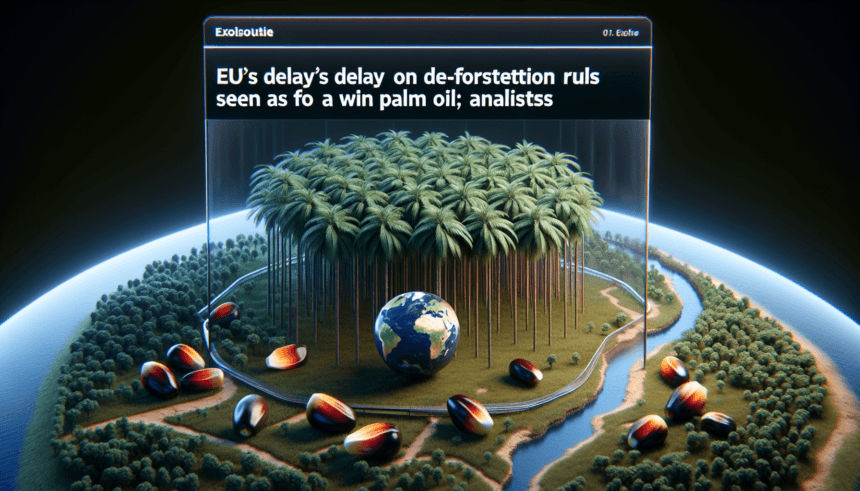Main Points In Hindi (मुख्य बातें – हिंदी में)
-
ईयू की पाम तेल मांग में वृद्धि की उम्मीद: व्यापारियों का मानना है कि यूरोपीय संघ के वनों की कटाई विरोधी नियमों (ईयूडीआर) के लागू होने में 12 महीने की देरी से पाम तेल की मांग बढ़ सकती है, जो महीने के इस समय में सामान्य से कम है।
-
ईयूडीआर नियमों में बदलाव: यूरोपीय आयोग ने वनों की कटाई से जुड़े उत्पादों पर अंकुश लगाने की समय सीमा को बढ़ा दिया है, जिससे बड़ी कंपनियों के लिए 2025 और छोटे उद्यमों के लिए 2026 तक अधिक समय मिल रहा है, ताकि वे नियमों का अनुपालन कर सकें।
-
वैश्विक आलोचना और चिंताएँ: प्रमुख खाद्य उत्पादक देशों जैसे ब्राज़ील, इंडोनेशिया और मलेशिया ने ईयूडीआर नियमों की आलोचना की है, यह कहते हुए कि ये छोटे किसानों को हानि पहुँचाते हैं, और इससे उनकी कृषि वस्तुओं पर निर्भरता पर प्रतिबंध लगाया जा रहा है।
-
महत्वपूर्ण सांख्यिकी: यूरोपीय संघ दुनिया का तीसरा सबसे बड़ा पाम तेल आयातक है, और आंकड़ों के अनुसार, ईयू ने 2023-24 में 3.8 मिलियन मीट्रिक टन पाम तेल का आयात किया है।
- स्वदेशी कृषि प्रभावित: यूरोपीय संघ के 27 देशों में से 20 देशों ने ईयूडीआर कानून में संशोधन या इसे निलंबित करने का समर्थन किया है, यह चिंता जताते हुए कि ये नियम यूरोपीय किसानों को भी प्रभावित कर सकते हैं।
Main Points In English(मुख्य बातें – अंग्रेज़ी में)
Here are the main points from the provided text:
-
Delay in EUDR Implementation: The European Union’s proposed Forestry Defunding Regulations (EUDR) aimed at controlling imports of products linked to deforestation will be delayed by 12 months. This delay is expected to increase demand for palm oil from European buyers.
-
Impact on Palm Oil Market: Traders and analysts believe that the delay creates a bullish outlook for palm oil markets, as it opens the possibility for increased orders from the EU in 2025.
-
Concerns Over Compliance: The postponement is primarily due to concerns expressed by global partners and European stakeholders regarding their readiness to comply with the additional due diligence requirements stipulated by the EUDR.
-
Criticism and Opposition: Major palm oil and soybean producing countries (Brazil, Indonesia, and Malaysia) have criticized the EUDR, claiming it unfairly targets small farmers and restricts their agricultural products. There is also opposition from European industry groups and member states over the complex data requirements, which they believe could disrupt supply and raise food prices.
- Import Statistics: The EU is a significant importer of palm oil and soybean, with recent statistics indicating imports of 3.8 million metric tons of palm oil and 13.8 million metric tons of soybean for the 2023-24 period.
These points summarize the key aspects of the EUDR’s implications for the palm oil market, stakeholder concerns, and the geopolitical landscape surrounding agricultural imports.


Complete News In Hindi(पूरी खबर – हिंदी में)
व्यापारियों को उम्मीद है कि देरी से यूरोपीय संघ के खरीदारों की ओर से मांग बढ़ेगी
ईयूडीआर नियमों को व्यापार भागीदारों, सदस्य राज्यों से झटका लगा है
पाम तेल व्यापारियों और विश्लेषकों ने 3 अक्टूबर को कहा कि कृषि आयात पर यूरोपीय संघ के वनों की कटाई विरोधी नियमों (ईयूडीआर) को लागू करने में प्रस्तावित 12 महीने की देरी पाम तेल बाजारों के लिए तेजी है क्योंकि इससे ब्लॉक से अपेक्षा से अधिक मांग बढ़ने की संभावना है। .
पंजीकृत नहीं है?
दैनिक ईमेल अलर्ट, ग्राहक नोट प्राप्त करें और अपने अनुभव को निजीकृत करें।
अभी पंजीकरण करें
2 अक्टूबर को, यूरोपीय आयोग ने वनों की कटाई से जुड़ी प्रमुख वस्तुओं के आयात पर अंकुश लगाने के लिए 2024 के अंत की समय सीमा को बड़ी कंपनियों के लिए 2025 के अंत तक और सूक्ष्म और लघु उद्यमों के लिए 30 जून, 2026 तक स्थगित करने का प्रस्ताव दिया।
मलेशियाई सब्जी के निदेशक लिंगम सुप्रमण्यम ने कहा, ईयू की पाम तेल की खरीद वर्तमान में वर्ष के इस समय के लिए सामान्य से बहुत कम है, लेकिन अगर ईयू देरी से आगे बढ़ता है तो यह ईयू खरीदारों के लिए 2025 के लिए ऑर्डर देने के द्वार खोल सकता है। तेल ब्रोकरेज पेलिंडुंग बेस्टारी।
2022 में प्रस्तावित आने वाले ईयूडीआर नियमों में सात प्रमुख कृषि वस्तुओं – मवेशी, कोको, कॉफी, रबर, पाम तेल, सोयाबीन और लकड़ी के डेरिवेटिव पर परिश्रम की आवश्यकताएं शामिल हैं – यह साबित करने के लिए कि उनकी आपूर्ति श्रृंखलाओं ने विश्व स्तर पर वनों की कटाई में योगदान नहीं दिया है, या भारी जुर्माना और व्यापार प्रतिबंध का सामना करना पड़ेगा।
कार्यान्वयन के लिए संशोधित समय-सीमा मुख्य रूप से वैश्विक भागीदारों के साथ-साथ यूरोपीय हितधारकों द्वारा ईयूडीआर शासन के तहत अतिरिक्त परिश्रम आवश्यकताओं के अनुपालन के लिए उनकी तैयारियों की स्थिति के बारे में व्यक्त की गई चिंताओं के कारण है, आयोग ने 2 अक्टूबर को कहा।
“वनस्पति तेल परिसर 2025 की दूसरी तिमाही तक तंग है [proposed] पाम तेल के लिए देरी आशावादी है और यह यूरोपीय आयोग के काम में सिर्फ जोखिम प्रबंधन है,” यूके स्थित एसएसवाई ग्लोबल के अनाज, तिलहन और नरम ब्रोकर मार्सेलो कुल्टेरा।
यूरोपीय संघ दुनिया का तीसरा सबसे बड़ा पाम तेल आयातक और सोयाबीन का दूसरा सबसे बड़ा आयातक है।
EUDR को उद्योग जगत का झटका
पिछले वर्ष में, सोयाबीन के सबसे बड़े उत्पादक ब्राज़ील के साथ-साथ पाम तेल के सबसे बड़े उत्पादक इंडोनेशिया और मलेशिया जैसे देशों ने इन नियमों की कड़ी आलोचना की है।
सभी तीन देशों ने औपचारिक रूप से यूरोपीय संघ से ईयूडीआर के कार्यान्वयन में देरी करने के लिए कहा है, जो उनका कहना है कि छोटे किसानों को गलत तरीके से लक्षित करता है और उनकी प्रमुख कृषि वस्तुओं पर अंकुश लगाता है।
हालाँकि, ब्लॉक को यूरोपीय संघ-आधारित उद्योग निकायों और सदस्य राज्यों की आलोचना का भी सामना करना पड़ा है, जिन्होंने चेतावनी दी है कि जटिल और अस्पष्ट डेटा आवश्यकताओं के कारण आपूर्ति में बाधा आएगी और प्रमुख खाद्य उत्पादों की कीमतें बढ़ेंगी।
मार्च में, यूरोपीय संघ के 27 देशों में से 20 देशों ने ऑस्ट्रिया द्वारा EUDR कानून को संशोधित करने या इसे निलंबित करने के आह्वान का समर्थन किया क्योंकि नियम यूरोपीय किसानों पर समान रूप से लागू होते हैं, उन्हें वनों की कटाई या खराब वुडलैंड्स पर खेती किए गए उत्पादों के निर्यात पर प्रतिबंध लगाते हैं।
अमेरिकी कृषि विभाग के आंकड़ों के अनुसार, यूरोपीय संघ ने 2023-24 में 3.8 मिलियन मीट्रिक टन पाम तेल और 13.8 एमएमटी सोयाबीन का आयात किया।
एसएंडपी ग्लोबल कमोडिटी इनसाइट्स के एक भाग प्लैट्स ने 2 अक्टूबर को कच्चे पाम तेल की कीमत $1,158/t सीआईएफ रॉटरडैम पर आंकी, जो उस दिन 2.2% अधिक थी।
कमोडिटी इनसाइट्स डेटा के अनुसार, मूल पक्ष पर, कच्चे पाम तेल एफओबी इंडोनेशिया की कीमत 2% बढ़कर $1,107/t हो गई।
Complete News In English(पूरी खबर – अंग्रेज़ी में)
Traders are hopeful that demand from European Union buyers will increase following a delay.
The EU Deforestation Regulation (EUDR) has been a setback for trading partners and member states.
On October 3, palm oil traders and analysts stated that the proposed 12-month delay in enforcing the EU’s anti-deforestation regulations (EUDR) for agricultural imports is bullish for palm oil markets. This delay may lead to higher demand from the EU than expected.
Not registered?
Receive daily email alerts, customer notes, and personalize your experience.
Register now
On October 2, the European Commission proposed postponing the deadline for restricting imports of key commodities linked to deforestation until the end of 2024 for large companies and until June 30, 2026, for micro and small enterprises.
Lingam Supramanian, director of Malaysian Vegetables, mentioned that EU palm oil purchases are currently much lower than usual for this time of year. However, if the EU’s implementation is delayed, it could open up avenues for EU buyers to place orders for 2025, according to the oil brokerage Pelindung Bestari.
The EUDR regulations proposed in 2022 include due diligence requirements for seven major agricultural commodities: cattle, cocoa, coffee, rubber, palm oil, soybeans, and wood derivatives. Producers must prove their supply chains did not contribute to global deforestation, or they risk facing heavy fines and trade restrictions.
The revised implementation timeline is primarily due to concerns raised by global partners and European stakeholders about their readiness to comply with the additional due diligence requirements under the EUDR, as stated by the Commission on October 2.
“The vegetable oil market is tight until the second quarter of 2025; the delay for palm oil is optimistic and a risk management action by the European Commission,” said Marcelo Cuterra, a grain, oilseed, and soft broker at SSY Global based in the UK.
The EU is the world’s third-largest importer of palm oil and the second-largest importer of soybeans.
EUDR’s Impact on the Industry
Over the past year, major soybean producers like Brazil, as well as Indonesia and Malaysia, the largest producers of palm oil, have criticized these regulations.
All three countries have formally requested the EU to delay the implementation of the EUDR, claiming it unfairly targets small farmers and imposes restrictions on their key agricultural products.
However, the EU has also faced criticism from industry bodies and member states, warning that complicated and unclear data requirements could disrupt supply chains and increase prices for key food products.
In March, 20 of the 27 EU countries supported Austria’s call to amend or suspend the EUDR law, as the regulations apply equally to European farmers, restricting the export of products sourced from deforested or degraded lands.
According to data from the US Department of Agriculture, the EU imported 3.8 million metric tons of palm oil and 13.8 million metric tons of soybeans in 2023-24.
S&P Global Commodity Insights (part of Platts) estimated on October 2 that the price of crude palm oil was $1,158 per ton (CIF Rotterdam), which was a 2.2% increase from the previous day.
Commodity Insights data indicated that the price of crude palm oil FOB Indonesia increased by 2%, reaching $1,107 per ton.










